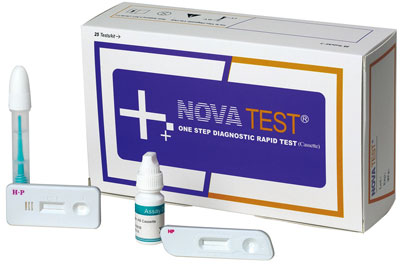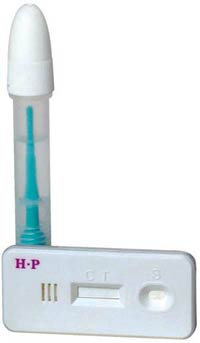H.Pylori Test Kits
H.Pylori IgM and H.Pylori IgG Dot Assay kits, H.Pylori antibody and antigen rapid test kits are available.

H.Pylori Test Kits

H.Pylori antibody rapid test Kit is a rapid medical testing device based on the principle of lateral flow chromatographic immunoassay principle, for the qualitative detection of antibodies of all isotypes (IgG, IgM, IgA, etc.) specific to Helicobacter pylori in human serum, plasma or whole blood specimen. H.pylori antigen feces test kit is an immunoassay for the detection of H.pylori antigen in human feces specimen. And H.pylori IgG and IgM dot filtration test kits are rapid test kits based on the principle of dot filtration immunoassay, used to detect IgG and IgM antibody to Helicobacter pylori in human serum or plasma.
All these rapid H.pylori test kits are intended to be used as an aid in the diagnosis of H.pylori infections in patients with gastrointestinal symptoms; and are recommended for professional use.
CE marked H.Pylori Antigen Test

For H.Pylori Antigen Rapid Test kit, we have undergone the notification process with EU notified party TUV through our EU Representative, and thus got permission to print CE mark on this product. Features of this CE H.Pylori Antigen test kit is as follow:
- Easy to perform; no other reagent is needed;
- To confirm a positive result in as short as 15 minutes;
- Sensitivity 94.1%, Specificity 100% relative to CLO test (rapid urease test)
Stomach Ulcers
Helicobacter pylori is a bacterium that lives on the lining of the stomach, which is the main cause of stomach ulcers. Studies shows that 90% stomach ulcers are caused by H. pylori.
Stomach ulcers can be cured with the right antibiotics. Before this treatment, the doctor must make certain whether it is caused by H.pylori bacterium. Several techniques, both invasive and non-invasive are utilized to diagnose H.pylori infection. In the in-vitro test realm, both H.pylori antibody test and antigen test are available. H.pylori serum test kits are used to detect anti-H.pylori specific antibody, mostly IgG antibodies in a patient's blood. This Serological approach detects the host's immune response to the infection, but does not distinguish a current active infection from a past infection. In addition, the antibody titer does not change during the treatment, and make the serum test not suitable for the prognosis use.

 Atlas Link Technology Co., Ltd
Atlas Link Technology Co., Ltd